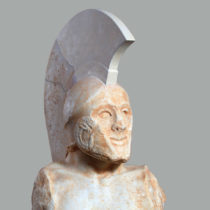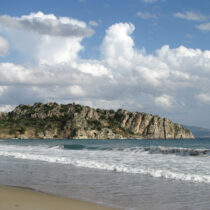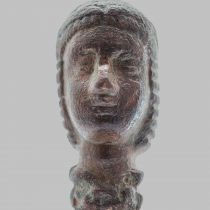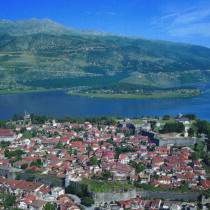Athens and Attica in prehistory
This conference is meant to offer the opportunity for more synthetic approaches, which will bring together old and new excavation data, place it into a wider archaeological context, and address major historical questions.
Auction houses should double-check origins of antiquities they are about to sell
Last week Christie's and Bonham's removed an oinochoe and a pyxis from their upcoming auctions, after Christos Tsirogiannis identified them as having been sold by Italian smugglers.
Guarding Grapes and Other Tales from Papyri
The latest volume of a University of Cincinnati-edited papyrus research journal throws light on the perils of produce patrol and more stories from ancient times.
Getty To Return Byzantine Illuminated New Testament to Greece
The J. Paul Getty Museum announced today plans to voluntarily return a 12th-century Byzantine illuminated New Testament to the Holy Monastery of Dionysiou on Mount Athos in Greece.
Samothrace and the NE Aegean in Prehistory
Lecture on “Samothrace and the NE Aegean in Prehistory” at the American School of Classical Studies at Athens.
Illicit Antiquities No More
Launching on April 12th and until May 31st 2014, the temporary exhibition “Illicit Antiquities No More” will be hosted at the Archaeological Museum of Igoumenitsa.
Flinders lecturer dives into archaeology’s next frontier
As a specialist in prehistoric underwater archaeology, Dr Jonathan Benjamin looks at rising sea levels a little bit differently from most people.
Ahmose I and the Volcano
Ahmose I was possibly contemporary to the Thera eruption, as new evidence move his reign earlier than the commonly accepted date.
The Karian Sanctuary of Labraunda between Greeks and Persians
Olivier Henry (IFEA, Istanbul) will give a lecture about the Karian Sanctuary of Labraunda on Thursday, April 10, in Athens.
Εarly humans and beasts of prey
It is highly likely that humans were confronted by saber-toothed cats at the Schöningen lakeside. In that case, all the human could do was grab his up to 2.3m long spear and defend himself...
Mosaics In The Desert
Israel Antiquities Authority archaeologists digging at the site of Hura, Negev desert in the framework of salvage excavations, discovered the impressive remains of an Early Christan monastery, where mosaics were found in a good state of preservation.
The Sacred Slippers (emvades) of St. Dionysius of Zakynthos
This article will be referring to the history, the crafting and the tradition of the sacred slippers (emvades) of St Dionysius of Zakynthos.
Taking Apollo by the horns
In the context of the Aigeiros lecture series Nicola Nenci (University of Edinburgh) will give a lecture entitled “Taking Apollo by the horns. Reconsidering Apollo Karneios’ iconography in the light of IG V 1, 222.”
Homo’s Brain Growth Inversely Proportional to Tooth Growth
Humans are the only primates where, throughout their 2.5-million year history, the size of their teeth has decreased in tandem with the increase in their brain size.
“…ship sank, everything lost…”
In the framework of the Cyprus Seminar Stella Demesticha (Assistant Professor of Maritime Archaeology, University of Cyprus) will give a lecture entitled “‘...ship sank, everything lost...’. Six years of underwater excavations at the Mazotos shipwreck”.
How Nomad Herders Changed the Way We Eat
The various uses of grain were spread along Eurasia through nomadic shepherds, as they evidenly had access in different grain species, archaeologists suggest.
Statues Stolen From Jebel Barkal Museum
It has been reported that the museum at Jebel Barkal -which is a UNESCO World Heritage Site- has been found guarded by a single security official while several of its artefacts are displayed on tables which are open to the visitor.
Asbestos Found In Byzantine Wall-Paintings
Byzantine wall-paintings in the monastery stood the test of time with the help of a "magic touch".
Sussex’s First Sub-Saharan Resident?
Radiocarbon dating on the bones gave a firm Roman date – around 200 or 250 AD, while isotope analysis indicated she resided in South East England.
Developing a Greek Research Infrastracture for the Humanities
DARIAH-GR will be launched at this two-day kick-off meeting.
A Bazaar Full of Treasures
The police recorded 180 objects, including pottery vessels, textiles and objects of metal representing the Pre Columbian cultures of Inca, Chimu and Chancay.
Museum, memory and society
Nikos Papadimitriou (Cycladic Art Museum) will give a lecture at the Irish Institute of Hellenic Studies in Athens.
Vote for the Public Choice Award
The Europa Nostra Team has announced the 27 winners of the 2014 European Union Prize for Cultural Heritage and invites the public to vote for their favourite heritage achievements among them.




























